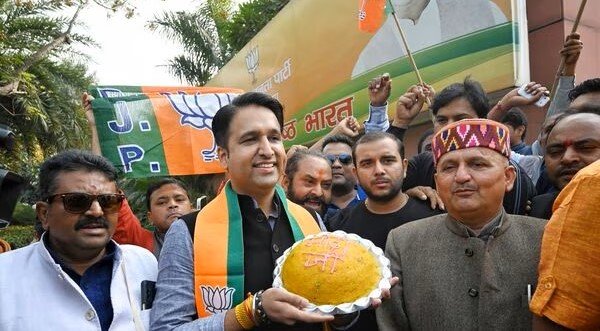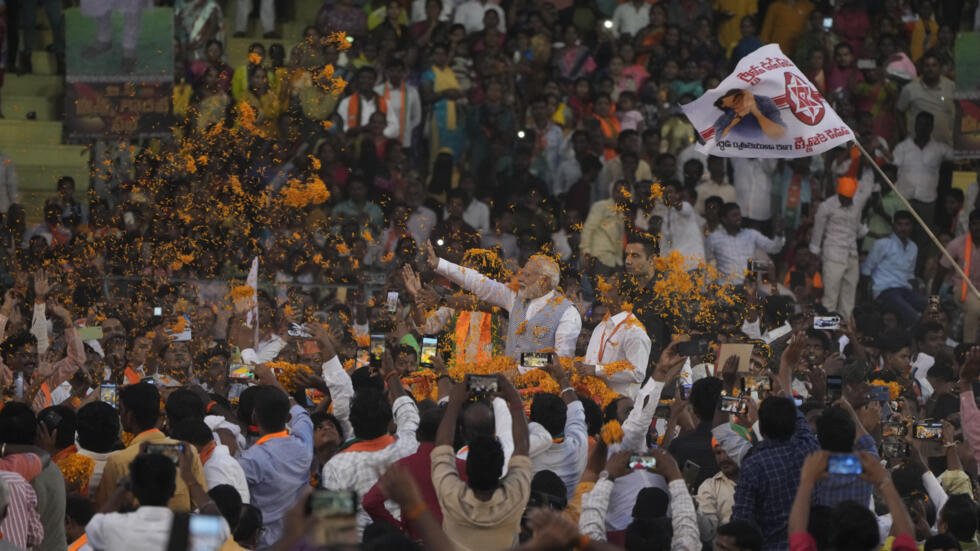State Poll Results: In India, three of the four major state poll elections are expected to be won by Narendra Modi’s Bharatiya Janata Party (BJP) before the vital general elections that take place the following year. In the states of Madhya Pradesh, Rajasthan, and Chhattisgarh, the BJP holds a strong advantage. In the southern state of Telangana, the Congress has a commanding lead.
A sixth of India’s electorate, or over 160 million individuals, were eligible to vote in the November elections. Mizoram, the fifth state, has to have its vote counted by Monday. Were these polls a test to see if Mr. Modi might win a record third term in the national elections that will take place early next year? Put more simply, would the Congress’s better performance have suggested that the BJP would be headed for a setback?
Not exactly. Three significant state elections—Rajasthan, Madhya Pradesh, and Chhattisgarh—were won by the Congress in 2018. After three months, the BJP won every state and the federal general election. In India, state elections are contested on problems unique to a state or area, whereas national issues are the focus of general elections.
In spite of this dynamic, Mr. Modi is already targeting a record-breaking third term next year. So the results on Sunday are a big boost.
State Poll Results

The fact that the BJP has consistently lost state elections adds further significance to the victory. Up until now, the party, which has a sizable majority in parliament, has only had direct control over nine of India’s twenty-eight states. The remainder forged alliances with less powerful allies.
In the “Hindi heartland” of northern and central India, the BJP appears to be practically unbeatable after seizing back control of Rajasthan and Chhattisgarh from the Congress and holding onto Madhya Pradesh for a record-breaking fifth term. In this Hindi-speaking region, ten states send 225 MPs to the legislature; in 2019. The BJP won 177 of those seats.
However, the Congress placed greater importance on the elections.
A stronger showing would have been extremely encouraging and established the party as the rightful head of the newly formed INDIA coalition, which consists of 28 opposition parties. The party seemed to be in the lead at one time in the Madhya Pradesh contest. But then the BJP gained ground and the party lost steam. The party is now failing to hold onto state administrations, a continuation of its historical struggles to translate victory in states into triumphs in national elections. Congress faces greater anti-incumbency sentiment.
There is one bright spot, though. The southern state of Telangana, where the local BRS party was beleaguered by anti-incumbency sentiment, was taken over by the Congress. It is still gaining ground in southern India, even after winning handily in Karnataka in May.
How BJP is Winning the Majority?

What then were the determinants of voting behavior in the most recent surveys? In addition to government experience, factors like caste, identity, and the attraction of the Hindu nationalism. Promoted by the BJP also appear to have an impact on voting behavior.
Mr. Modi himself declared during his campaign that 800 million of India’s poorest citizens will receive 5 kg of free grain each month for the next five years. The resurrection of his party in Madhya Pradesh was partly attributed to a scheme that provides qualified women from lower-class families with a monthly stipend of 1,250 rupees [$16; £12]. Women make up around 47% of the state’s 50 million voters.
While many pundits labeled this kind of welfarism—practiced by both parties—competitive populism. It also highlighted the precarious situation of millions of Indians who rely on government assistance to make ends meet. After ten years in office, Mr. Modi’s popularity seemed to be holding steady. As seen by a countrywide poll conducted in August by India Today magazine. Over fifty percent of respondents thought he should continue to govern India.
Massive resources, an enormous, round-the-clock party apparatus, a government based on a strong welfare architecture. And a media that is generally favorable all contribute to the BJP’s powerful armament. The fact that Mr. Modi and his party seem to be favorites to win an incredible third term next year is scarcely unexpected.








Be First to Comment